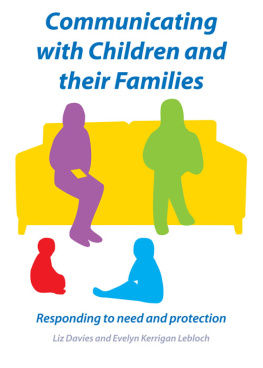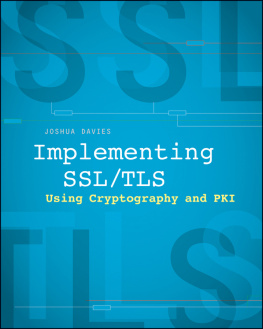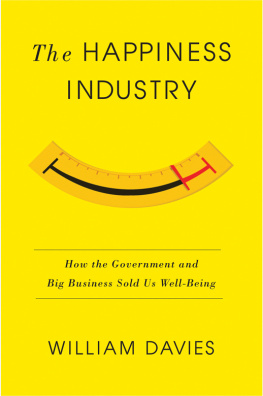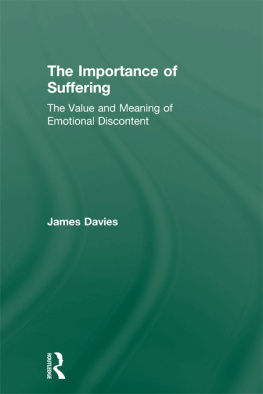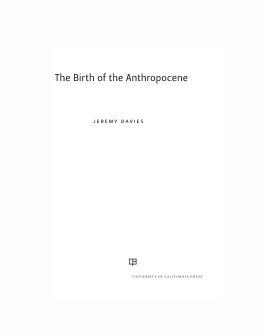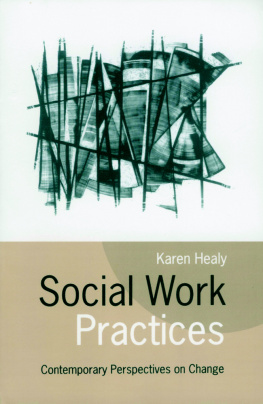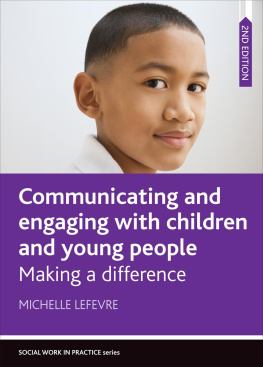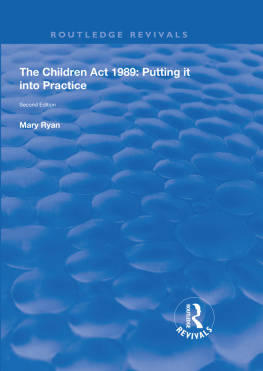
Open University Press
McGraw-Hill Education
McGraw-Hill House
Shoppenhangers Road
Maidenhead
Berkshire
England
SL6 2QL
email: enquiries@openup.co.uk
world wide web: www.openup.co.uk
and Two Penn Plaza, New York, NY 101212289, USA
First published 2013
Copyright Liz Davies and Evelyn Kerrigan Lebloch, 2013
All rights reserved. Except for the quotation of short passages for the purpose of criticism and review, no part of this publication may be reproduced, stored in a retrieval system, or transmitted, in any form or by any means, electronic, mechanical, photocopying, recording or otherwise, without the prior written permission of the publisher or a licence from the Copyright Licensing Agency Limited. Details of such licences (for reprographic reproduction) may be obtained from the Copyright Licensing Agency Ltd of Saffron House, 610 Kirby Street, London EC1N 8TS.
A catalogue record of this book is available from the British Library
ISBN13: 9780335244188 (pb)
ISBN10: 0335244181 (pb)
eISBN: 9780335244195
Library of Congress Cataloging-in-Publication Data
CIP data applied for
Typesetting and e-book compilations by
RefineCatch Limited, Bungay, Suffolk
Fictitious names of companies, products, people, characters and/or data that may be used herein (in case studies or in examples) are not intended to represent any real individual, company, product or event.
Praise for this book
Such an informative and engaging book, a toolkit for student social workers and practitioners to reflect upon, when dealing with complex cases. This book encompasses in depth discussions, surrounding insightful case studies; which are thought provoking and gives the reader a deeper level of understanding, whilst incorporating significant research, legislation and theoretical frameworks, which underpin good social work practice. An extremely valuable resource for all practitioners!
Faye Egalton, Student social worker, University of Kent, UK
This innovative book explores the use of communication through five practice examples. Each practice example utilizes verbatim dialogues between professionals and service users to explore communication. This approach is unique and unlike other books which attempt to explore communication through the use of case studies. There are comments that follow the dialogues to support the understanding of the meaning of the dialogues and offers suggestions for improvements and alternative dialogues. There are good links to theory, methods, values and ethics, research and critical reflection. Both students and qualified social workers will find this book useful in developing, analysing and critically reflecting on their communication skills.
Sally Lunnon, Early Years Graduate and Final Year Social Work Student
To the survivors of child abuse who
have provided the inspiration for
this book.
 | Contents |
Figures
Tables
We wish to thank Peter McGarry of the Eyewitness Theatre Company for allowing adaptation of two of the scenarios that have been used as the basis for Chapters 1 and 3. The Eyewitness Theatre Company delivers drama-based training modules on all aspects of Safeguarding.
Social work as social activism
This book presents communication as central to social work as a profession situated firmly in concepts of human rights and social justice. In the context of extreme cuts to welfare provision and a policy drive to roll back the welfare state and replace it with private provision, it is a tall order indeed to ask the reader to use this book to guide their practice as they strive to retain a firm hold on professional standards and social work principles. Social work happens at the interface of the individual and the state. It provides a buffer zone where the relationship can be defined, explored and challenged. As the book goes to press, social work is in disarray with a new regulatory body, a struggling College of Social Work, government attempts to localize and deregulate statutory guidance and strategies for the wholesale privatization of services. At the same time there is a grassroots resurgence of interest in radical social work and community activism. The Social Work Action Network (SWAN), for instance, provides a focus for a progressive approach which unites service users, social workers, social work students and academics in ongoing debate, campaigning and social action.
The authors attempt to present, based on their practice experience within childrens services, real life, current case studies using scripts to illustrate the detail of the work. Five areas of front-line practice are used to highlight contentious areas of social work. These have been chosen to best demonstrate the complexities and nuances of the work in order to emphasize the importance of communication as one component of a highly specialist professional task when located within a politically oppressive climate, particularly for the marginalized. Communication cannot be effective if it is not delivered in a context of understanding the theory and methods of communication, ethics and values and a strong knowledge base related to each case. It is hoped that this book will assist social workers in developing confidence in their skills as authentic social workers competent in resisting all forms of oppression, and acting always in the best interests of service users and the most vulnerable.
Communication as a means of achieving change and confronting misuse of power
It was Friere who stated that people are not built in silence, but in word, in work, in action-reflection (1972: 61). Communication is a form of action. Social workers crucially bear witness to the lives of children and their families and this is indeed a privilege. They do so in a context of social and economic structures that promote inequity and oppression. It is a social work responsibility to promote human rights and social justice when their employers are promoting the interests of the powerful (IFSW 2012). Social work, in representing the interests of children and families, needs to have its basis in good communication skills framed within a concept of social activism. A social workers lived practice experience must be highly valued because it is formed at the interface of the most vulnerable and the most powerful and carries with it major social responsibilities. Garrett stated that social work is to aid people in communities who feel powerless, as the fiery tides of globalisation wash all around them (2003a: 86, 2003b: 452). Fook wrote about critical social work linking awareness of structural domination with everyday experience and the need to rely on communication as a major transformative process (2002: 18). She stated the need to continually redevelop critical practice so that it is relevant to global and local contexts.
Next page
